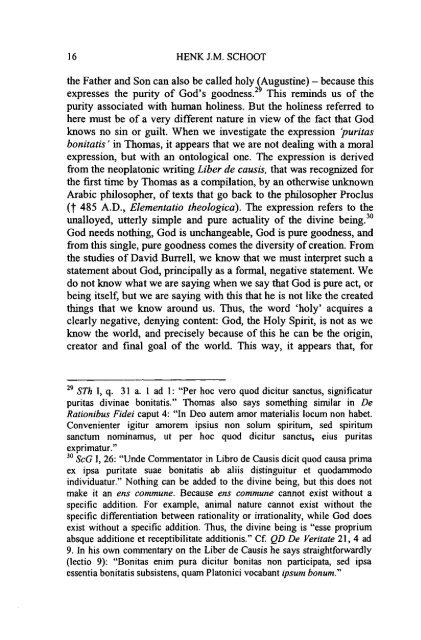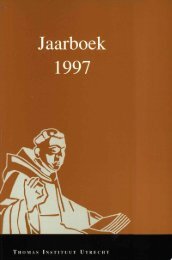Jaarboek Thomas Instituut 2006 - Thomas Instituut te Utrecht
Jaarboek Thomas Instituut 2006 - Thomas Instituut te Utrecht
Jaarboek Thomas Instituut 2006 - Thomas Instituut te Utrecht
You also want an ePaper? Increase the reach of your titles
YUMPU automatically turns print PDFs into web optimized ePapers that Google loves.
16 HENK J.M. SCHOOT<br />
the Father and Son can also be called holy (Augustine) - because this<br />
expresses the purity of God's goodness" This reminds us of the<br />
purity associa<strong>te</strong>d with human holiness. But the holiness referred to<br />
here must be of a very different nature in view of the fact that God<br />
knows no sin or guilt. When we investiga<strong>te</strong> the expression 'puntas<br />
bonitatis' in <strong>Thomas</strong>, it appears that we are not dealing with a moral<br />
expression, but with an ontological one. The expression is derived<br />
from the neoplatonic writing Liber de causis, that was recognized for<br />
the first time by <strong>Thomas</strong> as a compilation, by an otherwise unknown<br />
Arabic philosopher, of <strong>te</strong>xts that go back to the philosopher Proclus<br />
(t 485 A.D., Elementatio theologiea). The expression refers to the<br />
unalloyed, ut<strong>te</strong>rly simple and pure actuality of the divine being."<br />
God needs nothing, God is unchangeable, God is pure goodness, and<br />
from this single, pure goodness comes the diversity of creation. From<br />
the studies of David Burrell, we know that we must in<strong>te</strong>rpret such a<br />
sta<strong>te</strong>ment about God, principally as a formal, negative sta<strong>te</strong>ment. We<br />
do not know what we are saying when we say that God is pure act, or<br />
being itself, but we are saying with this that he is not like the crea<strong>te</strong>d<br />
things that we know around us. Thus, the word 'holy' acquires a<br />
clearly negative, denying con<strong>te</strong>nt: God, the Holy Spirit, is not as we<br />
know the world, and precisely because of this he can be the origin,<br />
creator and final goal of the world. This way, it appears that, for<br />
29 STh I, q. 31 a. I ad I: "Per hoc vero quod dicitur sanctus, significatur<br />
puritas divinae bonitatis." <strong>Thomas</strong> also says something similar in De<br />
Rationibus Fidei caput 4: "In Deo au<strong>te</strong>m amor ma<strong>te</strong>rialis locum non habet.<br />
Convenien<strong>te</strong>r igitur amorem ipsius non solum spiriturn, sed spiritum<br />
sanctum nominamus, ut per hoc quod dicitur sanctus, eius puritas<br />
exprimatur."<br />
30 ScG I, 26: "Unde Commentator in Libro de Causis dicit quod causa prima<br />
ex ipsa purita<strong>te</strong> suae bonitatis ab aliis distinguitur et quodammodo<br />
individuatur." Nothing can be added to the divine being, but this does not<br />
make it an ens commune. Because ens commune cannot exist without a<br />
specific addition. For example, animal nature cannot exist without the<br />
specific differentiation between rationality or irrationality, while God does<br />
exist without a specific addition. Thus, the divine being is "esse proprium<br />
absque additione et receptibilita<strong>te</strong> additionis." Cf. QD De Verita<strong>te</strong> 21, 4 ad<br />
9. In his own commentary on the Liber de Causis he says straightforwardly<br />
(Iectio 9): "Bonitas enim pura dicitur bonitas non participata, sed ipsa<br />
essentia bonitatis subsis<strong>te</strong>ns, quam Platonici vocabant ipsum bonum."








